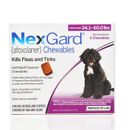What to do about allergies in dogs?
Allergies are not only a human problem; our four-legged friends can also suffer from them. If you notice that your dog has watery eyes or is constantly scratching, cetirizine could be the solution.
In this article, you'll learn all about the use of cetirizine in dogs, including the correct dosage and possible alternatives. As with any medication, administration and dosing should only be used after consulting with a veterinarian.
Suitability and tolerability for dogs
Cetirizine is an active ingredient that can be used in case of allergic reactions. In this regard, it has proven its effectiveness as an antihistamine and is considered very safe.
Although there is no medication with this drugofficially approved for dogs, human preparations can be prescribed by veterinarians.
Administration of cetirizine to dogs
The application of cetirizine varies depending on your dog's individual needs and preferences. While some dogs swallow tablets and capsules with no problem, others might need to hide the drops in a treat.
The choice of time of day for administration could also be influenced by the type of allergy present. If respiratory problems occur or the possibility of fatigue-related side effects, administration in the evening could be beneficial.
Dosage of the active substance cetirizine
The dosage of cetirizine for dogs should always be done in consultation with a veterinarian, as it depends on several factors, including the dog's weight, size, health condition, and individual needs.

Effect of cetirizine
Its mode of action is based on inhibiting the production of histamine in the body, which is responsible for triggering allergic symptoms.
Adherence to the correct dosage and consideration of the dog's individual factors are critical to the success of the treatment. Consultation with a veterinarian is essential to ensure that cetirizine is the right solution for your dog and to explore alternative treatment options if necessary.
Range of use in dogs
Cetirizine is a fundamentally suitable and largely harmless option for dogs with allergies. As an antihistamine, it can be used to relieve allergic signs such as itchy skin, sneezing, and rhinitis.
Side effects of cetirizine
Using cetirizine in dogs can have potential side effects, similar to other medications. It is important to note that dogs can react differently to medications on an individual basis, and not all dogs will necessarily experience side effects.
Cetirizine is generally considered to be very safe. Possible side effects include the following:
- Drowsiness: some dogs may become drowsy or lethargic after taking cetirizine.
- Gastrointestinal discomfort: Cetirizine may cause gastrointestinal problems such as vomiting or diarrhea in some cases.
- Decreased saliva production: dogs may develop a dry mouth or increased thirst.
It is important to carefully monitor your dog's reactions to the medication. Dosage and administration of cetirizine should always be done in consultation with a veterinarian to ensure the best outcome for your dog's health.

What else can help with allergies in a dog?
Aside from cetirizine, there are many other measures that can be taken to relieve the symptoms of allergies in a dog.
Identifying the cause
It is always important tofind out the cause of the dog's condition. This way, the best way to help the dog is to use specific therapies or medications.
It also helps rule out possible differential diagnoses, which are alternative diseases or conditions that are considered in a patient when certain symptoms or signs are present.
Symptom relief for allergies
In addition to cetirizine, the following may help relieve allergy symptoms:
- Avoidance: for this, a change in diet for food allergies or a change in environment for contact allergies may be helpful.
- Home remedies: cooling with a wet towel or cold tiles can relieve itching.
- Specific immunotherapy: desensitization can bring improvement in 60-70% of cases.
- Use of other anti-allergic drugs: Besides cetirizine, other agents such as ciclosporin or corticosteroids are also possible, but they may be associated with higher costs or more severe side effects.
Sources and relevant links
Wolfgang Löscher, Angelika Richter (2016). Lehrbuch der Pharmakologie und Toxikologie für die Veterinärmedizin. Hrsg. 4., vollständig überarbeitete Auflage. Enke Verlag.
PubChem
Accessed on 15.08.2023
Download: Gebrauchsinformation (Zyrtec, 10 mg Filmtabletten)
Accessed on 15.08.2023
Wolfgang Löscher, Angelika Richter, Heidrun Potschka (2014). Pharmakotherapie bei Haus- und Nutztieren. Hrsg. 9., aktualisierte und erweiterte Auflage. Enke Verlag.
CliniPharm/CliniTox
Accessed on 15.08.2023




















